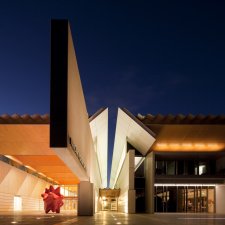- About us
- Support the Gallery
- Venue hire
- Publications
- Research library
- Organisation chart
- Employment
- Contact us
- Make a booking
- Onsite programs
- Online programs
- School visit information
- Learning resources
- Little Darlings
- Professional learning
Russell Page (1968–2002), choreographer, dancer and actor, was from the Nunukul (Noonuccal) people and the Munaldjali clan of the Yugambeh people of south-east Queensland. The youngest of twelve children, he grew up in the working-class Brisbane suburb of Mt Gravatt. He was a skilled rugby league player, chosen to play for the Queensland Zone side, but at the age of sixteen he chose instead to follow his brother to study at the National Aboriginal Islander Skills Development Association's Dance College in Sydney. Overcoming his initial rebellion at the discipline of dance, he quickly became 'pure spirit' in performance, equally breathtaking as an earth-bound or aerial dancer. With brothers Stephen, an artistic director, and David, a composer, he was a founder of the Bangarra Dance Theatre, and was its principal artist from 1991. Page occasionally took time to dance with other companies, including the Australian Dance Theatre in Adelaide and the Aboriginal and Islander Dance Theatre in Sydney. He was also a seasoned television and film performer, appearing in the feature film Kick, the contemporary opera Black River, ABC TV's Poison, Tracy Moffatt's film Bedevil and Christine Anu's Wanem Time. He represented Australia at the 1997 Venice Biennale and appeared in the opening and closing ceremonies of the Sydney Olympic Games in 2000. The Bangarra production Walkabout received typically ecstatic reviews from critics, with Page's solo singled out for special praise. He tragically passed away shortly after the close of the Sydney season of Walkabout in July 2002, leaving his family, his three children, and Australian art, dance and Aboriginal communities mourning an irreplaceable loss.
Stephen Page AO (b. 1965), Nunukul dancer and choreographer, has been artistic director of Bangarra Dance Theatre since 1991. Page moved to Sydney from Brisbane in the early 1980s to study dance at the National Aboriginal and Islander Skills Development Association, and performed with the Sydney Dance Company from 1983 to 1991. He and his brothers Russell (1968–2002) and David (1961–2016) joined the Bangarra Dance Theatre in the early 1990s – as artistic director, principal dancer and resident composer respectively. Stephen has since created many highly acclaimed ballets for Bangarra including Fish (1997), Walkabout (2002), Patyegarang (2014), Lore (2015) and Dark Emu (2018). For Bennelong (2018) he received three Helpmann Awards; he also won Helpmann Awards for Skin (2001), Corroboree (2002), Mathinna (2009), Fire (2010) and ID (2012). In addition, he has choreographed works for Opera Australia and the Sydney Theatre Company. For The Australian Ballet, Page choreographed Alchemy (1996) and Totem (2002), a solo for dancer Stephen Heathcote. His ballets Rites (1997) and Gathering (2006) were collaborations between Bangarra and The Australian Ballet. Page's first feature length film Spear (2015) premiered at the Toronto International Film Festival and he choreographed the films Bran Nue Dae (2009) and The Sapphires (2011). Made an Officer of the Order of Australia in the Queen's Birthday awards of 2017, Stephen Page spoke of his 'mixed feelings', but after talking with his Elders he decided to 'just respect it and take it in [his] stride, and just think about all those ancestors and people that have led before'.
Collection: National Portrait Gallery
Gift of the artist 2004
© Estate of Penny Tweedie
Penny Tweedie (age 60 in 2000)
Russell Page (age 32 in 2000)
Stephen Page AO (age 35 in 2000)
David Page (age 39 in 2000)
Penny Tweedie (47 portraits)



On one level The Companion talks about the most famous and frontline Australians, but on another it tells us about ourselves.



Visit us, learn with us, support us or work with us! Here’s a range of information about planning your visit, our history and more!



We depend on your support to keep creating our programs, exhibitions, publications and building the amazing portrait collection!